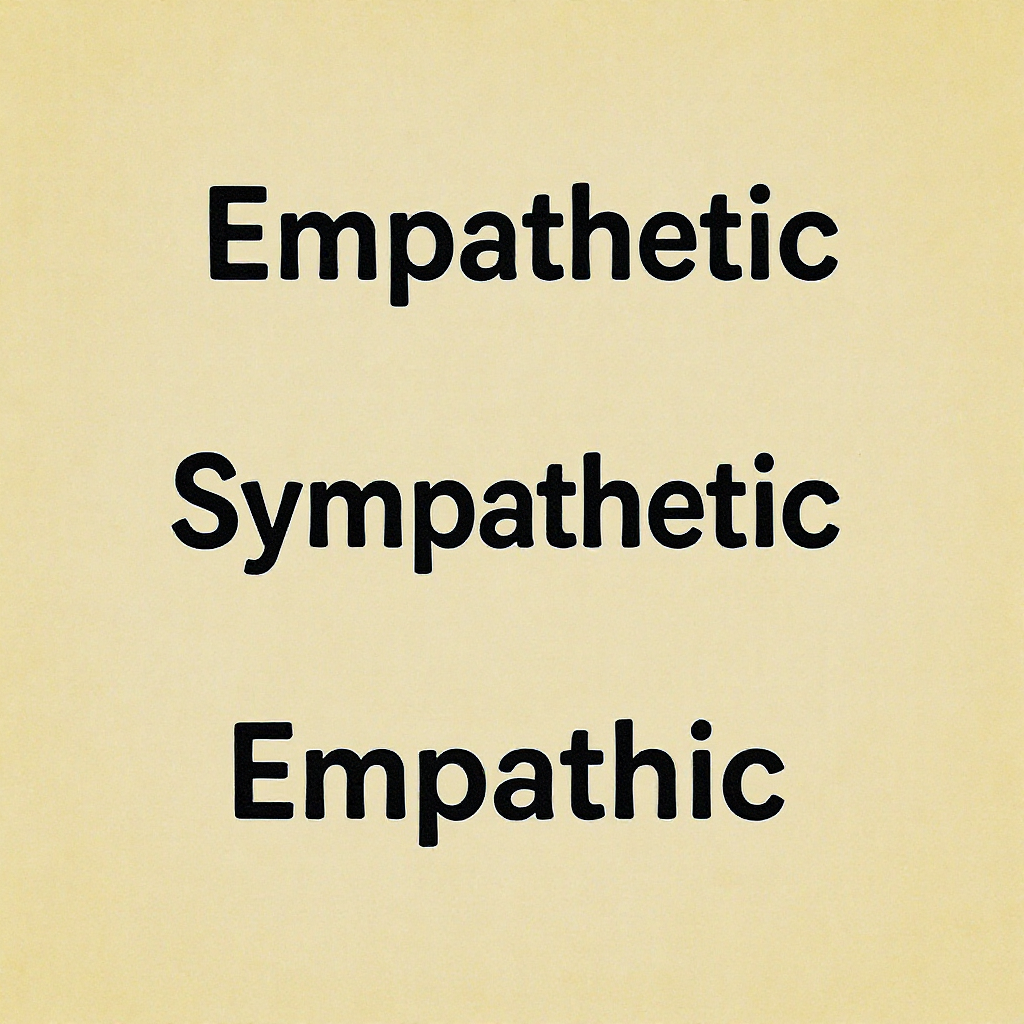"Empathetic" Vs "Sympathetic" Vs "Empathic" - What’s the Difference?

English has many words that look and sound similar, but their meanings can be slightly different. Empathetic, sympathetic, and empathic are perfect examples. People often use them interchangeably, but they don’t always mean the same thing.
Midoo AI will explain the differences in a clear way, with examples you can use in daily conversations.
What Does “Empathetic” Mean?
Empathetic means being able to understand and share another person’s feelings. When you are empathetic, you can imagine what someone else is going through and connect with their emotions.
Examples of “Empathetic”:
- She was very empathetic toward her friend who lost her job.
- An empathetic teacher understands when students are stressed.
- He gave me an empathetic look when I was nervous.
- Good leaders are often empathetic to their employees.
- The doctor’s empathetic approach made the patient feel safe.
👉 Think of empathy as “feeling with” someone.
What Does “Sympathetic” Mean?
Sympathetic means showing care, pity, or concern for someone’s situation, even if you don’t fully feel what they’re going through. You might feel sorry for them, but it doesn’t always mean you share the same emotions.
Examples of “Sympathetic”:
- She was sympathetic when I told her about my bad day.
- The judge was not sympathetic toward the criminal.
- He gave me a sympathetic smile after hearing the sad news.
- Neighbors were sympathetic after the accident.
- A sympathetic friend will always listen.
👉 Think of sympathy as “feeling for” someone.
What Does “Empathic” Mean?
Empathic has almost the same meaning as empathetic, but it’s more common in academic, medical, or psychological contexts. It sounds a bit more formal and is less used in daily speech.
Examples of “Empathic”:
- The counselor showed an empathic response during therapy.
- Some people are naturally more empathic than others.
- The study focused on the empathic skills of nurses.
- An empathic listener helps patients feel heard.
- His empathic ability made him a great psychologist.
👉 You can often replace empathic with empathetic, and the meaning won’t change.
Key Difference in Simple Words
- Empathetic = you feel with someone.
- Sympathetic = you feel for someone.
- Empathic = basically the same as empathetic, but more formal/clinical.
Quick Memory Tricks
- Empathetic → “empathy” → “sharing feelings.”
- Sympathetic → “sympathy card” → showing care or pity.
- Empathic → “psychology term” → academic or professional settings.
Common Mistakes Learners Make
❌ Saying “I’m sympathetic to your excitement” → Not correct, because excitement isn’t a problem or hardship. ✔️ Say “I’m empathetic to your excitement” (you share the feeling).
❌ Saying “She’s empathic” in casual chat → Sounds strange to everyday speakers. ✔️ Use “empathetic” in daily English instead.
Quick Reference Table
| Word | Meaning | Common Context | Example |
|---|---|---|---|
| Empathetic | Sharing and understanding feelings | Daily use | She’s very empathetic toward her students. |
| Sympathetic | Showing care or pity | Daily use | He was sympathetic when I was sick. |
| Empathic | Same as empathetic (formal) | Medical, academic | The therapist gave an empathic response. |
FAQs
Can I use “empathetic” and “empathic” interchangeably?
Yes, but “empathetic” is more common in everyday English, while “empathic” is more formal.
Is “sympathetic” always negative?
Not always. It usually describes showing concern for someone in difficulty, but it can also mean being supportive.
Do native speakers use “empathic”?
Not often in casual talk. It’s more common in psychology, counseling, or academic writing.
Which one should I use most of the time?
Use empathetic for sharing feelings, and sympathetic for showing care. Save empathic for formal or professional contexts.
Is empathy stronger than sympathy?
Yes. Empathy means you deeply connect with someone’s feelings, while sympathy is more about care or pity from the outside.
Final Thoughts
The three words are close, but they’re not the same:
- Empathetic = everyday word for sharing and understanding feelings.
- Sympathetic = showing care or pity without fully sharing feelings.
- Empathic = formal version of empathetic, used in psychology or academic writing.
If you want to sound natural in daily English, stick with empathetic and sympathetic. Use empathic only in professional or scientific contexts.
Midoo AI suggests practicing by writing two sentences: one where you are empathetic (sharing feelings) and one where you are sympathetic (caring but not sharing). That way, you’ll master the difference quickly.